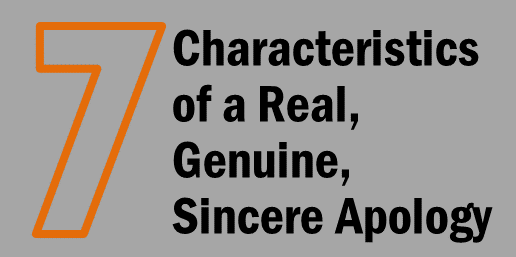A real apology, which only comes from a person that is truly sorry, is a request for mercy and forgiveness. It is like the Fruit of the Spirit (love, joy, peace, patience, kindness, goodness, faithfulness, gentleness, and self-control), which cannot be artificially added on from the outside, but flows out from a pure heart. A real, genuine, sincere apology is a blessing. But, nothing is worse than a faint apology, a false apology, a fake apology, or a non-apology.
What is an apology?
- a • pol • o • gy (noun)
- A written or spoken expression of one’s regret, remorse, or sorrow for having insulted, failed, injured, or wronged another.
A real, genuine, sincere apology is more than just a confession of wrongdoing. It is really a request for mercy and forgiveness; therefore, it needs to do more than just confess. The 7 characteristics of a real, genuine, sincere apology are…
1) RECOGNITION and REALIZATION — Understanding that you have done something wrong and being able to accurately acknowledge what you did. Call the wrong by name, don’t dilute it by referring to it indirectly with a euphemism. Nothing is worse than a faint apology, after a terrible wrong has been committed, which piously apologizes for some tiny little insignificant part of it or even something else that is unrelated (as in Matthew 5:23). Realize that the wrong has broken your relationship, which can be repaired only by confessing your wrong.
2) RESPONSIBILITY — Taking ownership of the blame for the wrong by admitting that you did it. This also means that you are prepared to accept consequences even years later (Galatians 6:7). A fake apology or a non-apology will not accept the responsibility for doing the wrong, it will excuse itself based on circumstances or intent. Don’t be like Saul who pushed the blame onto others (1 Samuel 15:15); instead, consider Shimei’s apology…
3) REGRET and REMORSE — Without regret and remorse for the wrong, it’s not even an apology. Regret is “to feel sorry, disappointed, or distressed about” the wrongdoing. Remorse is “moral anguish arising from repentance for past misdeeds.” A fake apology can have deep genuine sorrow for getting caught instead of regret and remorse for doing the wrong. Sometimes a non-apology even has real sympathy and concern for the wronged person without accepting the blame. This can be deceiving because of the 2 related meanings of sorry: (1) feeling distress, esp. through sympathy with someone else’s misfortune, and (2) in a poor or pitiful state or condition.
4) WITHOUT RESERVATION — A real, genuine, sincere apology does not add a caveat or an excuse for the wrong. It does not add a reason or a cause for the wrong. These excuses push the blame onto the one who has been wronged. Consider the first 2 kings of Israel: both committed grievous sins, both covered up their sins, both were confronted by a faithful prophet, both apologized, but only one was accepted, the other was rejected. Please read these carefully and prayerfully…
5) REPENTANCE and REVISION — Making a change to keep it from happening again. Don’t keep repeating the wrongdoing and repeating the apology. This makes it seem like you don’t understand the seriousness of the wrong and you aren’t really apologizing for the damage.
6) RESTORATION and RESTITUTION — Attempting to make it right, like Zaccchaeus did when he realized the error of his ways (Luke 19:8). Some wrongs cause so much damage they cannot ever be fully restored, but a real, genuine, sincere apology will include a real, genuine, sincere effort to repair the damage.
7) REVIVAL — You can live in victory! The exciting thing about a real, genuine, sincere Godly apology, is even though you have been guilty, you can clear yourself and be innocent after the apology. This doesn’t depend on the wronged accepting the apology. This doesn’t depend on the wronged forgiving the wrongdoer. This is the result of a clear conscience before God and man.
★) REST and RELIEF — When you have committed a wrong against another person, and you don’t make it right, your conscience will be hurt. Some cultures refer to this as damaging your own soul. When you have been wronged, and you don’t forgive, bitterness will build up. When you carry bitterness inside you, it’s like drinking poison and hoping the other person gets hurt. Neither of these is good for you. They can have physical consequences. The solution is rest and relief from apology and forgiveness.
ARE YOU READY TO APOLOGIZE? Please do not use this as a recipe for an apology. Please do not use this as a judgment of an apology. But, use this to examine yourself whether you are truly ready to make a godly apology. A faint apology, a false apology, or a non-apology will just make things worse. Do not make any apology until you can make a real, genuine, sincere apology. But, don’t stay that way for long…
When someone apologizes to you, or even if they don’t, you need to forgive them. If this seems impossible, please read:
- The amazing 1-step way to forgive
- Why can’t I forgive?
- 10 Ways Prayers are Hindered (#5 is Shocking)
- Stop doing these things (they will destroy the joy of your salvation)
More information about apology on the web:
- What Is an Apology
- We Suck at Sorry
- 5 Steps to a Sincere Apology
- How to Spot a Fake Apology
- 6 Types of Apologies That Aren’t Apologies at All
- Six elements of an effective apology, according to science — There are six components to an apology — and the more of them you include when you say you’re sorry, the more effective your apology will be, according to new research.

Do Lent Generously: Day 18 Apologise